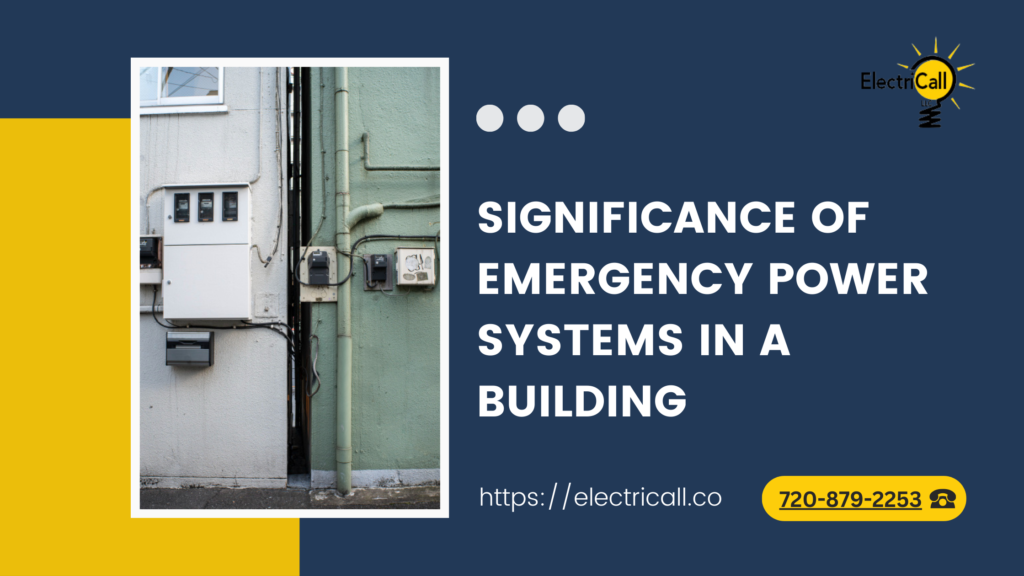
Significance of Emergency Power Systems in a Building
Power outages can have a significant impact in today’s era when almost every system in a smart building is dependent on electric power. This explains the importance of incorporating emergency power systems in buildings.
In commercial buildings, unplanned outages result in lost productivity and, hence, loss of income from the downtime coming from the inability to use machines or to get anything done. With the frequent power outages reported in Denver, Colorado resulting from the severe weather conditions in the region, installing emergency backup power systems is the best way to mitigate the effects of frequent thunderstorms, gusty winds, and lightning.
Read on to understand the role of emergency power systems in any building, especially in areas like Denver, where strong winds can disrupt power lines, leading to widespread outages.
Reduces Business Downtime
Power outages may sometimes take time to troubleshoot, depending on the intensity and causes. So, with an emergency power system, it is easier for basic operations such as lighting and heating to continue in any building. This means the building occupants will be comfortable throughout the repair process, reducing business downtime.
Safety and Security During Emergencies
Power blackouts may result from severe issues like electrical fires or dangerous weather conditions. The emergency backup systems ensure security lights will remain on and alarms will still be active.
This reduces the likelihood of individuals getting hurt during an evacuation, as security measures remain active during emergencies.
Data Protection
Commercial buildings hosting businesses that rely heavily on electronic data processing depend on emergency backup plans for data protection. These systems ensure uninterrupted power to a commercial building’s data centers, supply servers, and other IT infrastructure.
This is a huge relief for businesses in finance, healthcare, and e-commerce since backup systems guarantee the security of their most valuable asset: data.
Types of Backup Power Systems
As a commercial property owner, it is up to you to ensure employees remain highly productive by addressing common issues such as power outages. Even then, you need help from a licensed commercial Arvada electrician who will help you determine from either of these:
Backup Generators
Whether for home or business use, generators are inexpensive and provide 120 or 240-volt power, depending on your needs. You can also have portable power generators with a power range of 3000 to 6500W. These are simple and easy to install. Alternatively, permanent standby power generators are also a great option, especially for commercial buildings. These have automated starting processes, are more expensive than the portable options, and deliver 6500 -15000W.
Battery Backup Systems
Home battery backups are perfect for home use. These systems store energy from solar panels and other renewable sources. In a typical battery setup, the battery automatically supplies power to all devices. However, its capacity determines the exact duration the power lasts.
Commercial entities can use solar battery backup to ensure continued operations even when the grid fails. However, for utmost efficiency, businesses are better off with larger backup batteries to support their higher power demands and ensure uninterrupted operation of critical systems.
The cost of a backup battery may vary depending on the expected power capacity and the battery brand. A reliable backup battery guarantees an uninterrupted power supply during outages, providing convenience and assurance.
Choosing the Right Power Backup
Before settling for either option, whether the backup battery or generators, you need a better understanding of the operation of each option. This means contacting a licensed electrician in Denver to help you decide.
Backup batteries are better for moderate power needs and small-scale applications, while generators are good for high-power applications or buildings with larger power demands.
You must also evaluate and understand how much backup power you would need. Generators provide continuous power for extended periods, while batteries have limited capacity and may need recharging.
Think about the initial purchase and maintenance costs. Generators can be quite costly to acquire and maintain, and they are significantly larger units for commercial buildings. Batteries have lower purchase costs but may need maintenance and replacement over time.
FAQs
Do building codes require emergency power systems?
Building codes often require emergency power backup systems, especially in healthcare buildings and commercial facilities, in compliance with safety standards and regulations.
Which buildings benefit from emergency power systems?
Any building with a continuous power demand can benefit from emergency power systems. These include commercial and residential buildings, healthcare facilities, data centers, and industrial facilities.
What is the duration for which emergency systems can provide backup power?
The best power backup systems should provide power for hours to days, although it depends on usage.